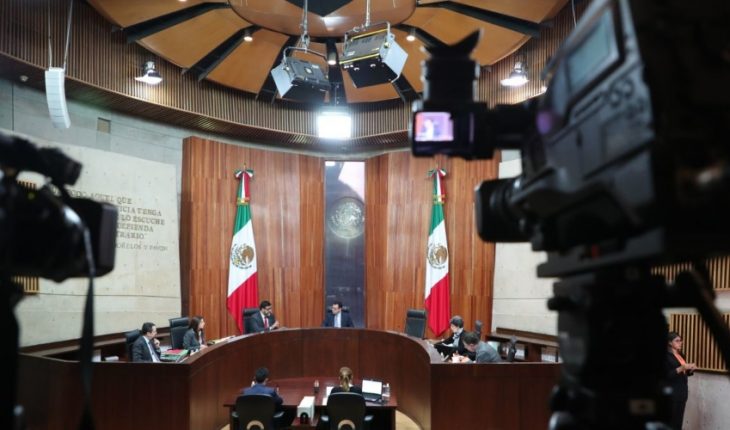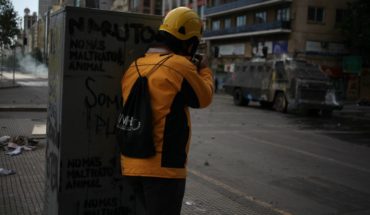The request of the chief judge of the High Chamber of the Electoral Tribunal of the Judiciary of the Federation (TEPJF), José Luis Vargas Valdez, to his colleagues to advance the meaning of his votes on the matters that will be discussed and resolved in public sessions, provoked the rejection of the majority of magistrates, who accused that this violated legality and their independence.
On Tuesday, an office was issued at the request of the magistrate president, in which he asked the rest of the magistrates to advance the meaning of their votes before the public session.
The document states that if the meaning of its votes is not sent before the start of the private session, “the public session will be suspended momentarily, and as many times as necessary, in order to have the optimal conditions to be able to clearly and timely reflect the outcome of the vote of the magistrates”.
TePJF ensures that this action is a “common practice” and not implemented by the current presidency.
The office is addressed to the members of the Higher Chamber and drafted by the Secretary General of Agreements, Carlos Vargas Baca, at the request of the president magistrate.
Read: 5 magistrates accuse the president of the Electoral Court of unilaterally postponing vote on Salgado
On Wednesday, in a statement, the TEPJF justified the request of the magistrate president and noted that advancing the sense of the judges’ votes prior to the sessions of the Higher Chamber is a common and voluntary practice.
“Given the information circulating in some media and social networks, we made it clear that in previous sessions of the High Chamber of the Electoral Court of the Judiciary of the Federation, it was regular practice for magistrates and magistrates to make known the meaning of their vote in matters that were subsequently resolved in public sessions” , is read at the beginning of the release.
It further denied that the sessions could be cancelled if the magistrates did not comply with this process.
However, at noon on Wednesday, five of the six judges in the Upper Chamber of the TEPJF issued an office to respond to the president magistrate, in which they “vigorously” reject their request.
The magistrates argue that Vargas Valdez’s indication is unacceptable for the following reasons:
It is a petition that lacks any legal basis and undermines our independence and autonomy which, as judges and judges, we have individually and as members of a collegiate court; independence and autonomy guaranteed in Articles 94 and 99, in relation to the 17th, of the Political Constitution of the United Mexican States.
The claim made to us in the office may lead to a liability, where as we are asked to advance the issuance of our vote before discussing the matters listed at the public resolution session.
The request made loses sight of the view that deliberation is one of the essential features of a collegiate court, as is this High Chamber. The request to send to the Secretary-General of Agreements the meaning of our votes, before the public resolution session, implies an attempt to distort the role of the court, or that judicial deliberation
irrelevant or unnecessary in a constitutional closing court.
“In this sense, the request that has been made to us attentive to the autonomy and independence with which we are covered as a judge and judge, because we are intended to define the opportunity that through the presentation and debate of matters, we can reflect on the original meaning of a position with regard to a project, which is not in line with the purpose of holding the public sessions of resolution of cases” , they add in the trade.
With regard to the warning to momentarily suspend sessions in the event that they do not have the meaning of the votes, the judges point out that it could hinder “the proper development of the public resolution session”.
You may be interested: False request to dismiss Cordova and tweets that do not exist: misinformation circulating on the INE in networks
In conclusion, for the above reasons, the magistrates consider that “the request for
which has been sent to us, because it does not have a legal basis, completely nullifies the possibility of debate and deliberation of the matters that arise and thereby reach the resolution of disputes in accordance with the principles that govern us as judge and judgers”.
They argue that the vote on matters should beonce the sentencing proposals have been put forward and debated, without it being valid to send a previous vote.
The trade is signed by the magistrates: Felipe Alfredo Fuentes Barrera, Reyes Rodríguez Mondragón, Janine Madeline Otalora Malassis, Indalfer Infante González and Felipe de la Mata Pizaña.
The only magistrate who did not sign such a document nor express a position is Monica Aralí Soto Fregoso.
What we do at Animal Politics requires professional journalists, teamwork, dialogue with readers and something very important: independence. You can help us keep going. Be part of the team.
Subscribe to Political Animal, receive benefits and support free journalism #YoSoyAnimal.





